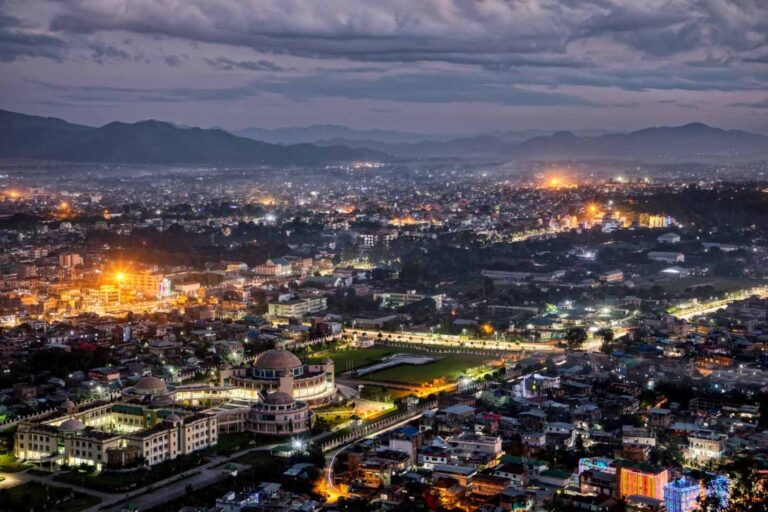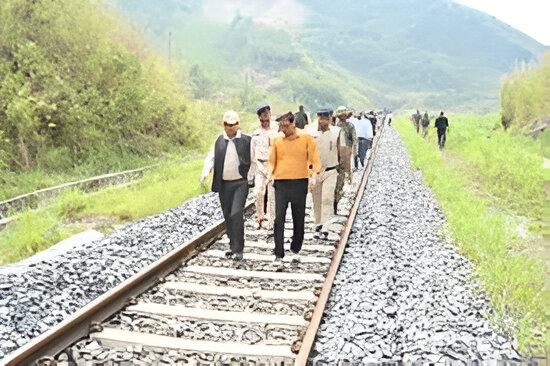No Progress in UNC Tripartite Talks: Understanding the Stalemate
Summary of the News
The latest round of tripartite talks between the United Naga Council (UNC), the Government of India, and the Manipur government ended without any tangible progress. These talks have been ongoing for several years, addressing critical issues such as Naga autonomy, land rights, and administrative division. Despite the efforts, no breakthrough has been achieved, leaving the situation at an impasse. This deadlock highlights the ongoing complexities of Naga identity politics and territorial issues within Manipur, which have long-standing historical roots.
No Progress in UNC Tripartite Talks: A Deep Dive into the Deadlock
For years, the Naga issue has been a deeply contentious matter in Northeast India, with the United Naga Council (UNC) being at the forefront of the fight for Naga rights. The tripartite talks between the UNC, the Government of India, and the Manipur government are part of ongoing negotiations aimed at addressing long-standing Naga grievances. But despite numerous rounds of dialogue, recent talks have again ended in a deadlock, with no clear path forward.
The failure of these talks to yield tangible results is not just about stalled negotiations—it speaks volumes about the broader challenges of resolving ethnic and territorial disputes in a region as complex and culturally rich as Manipur.
Background of the Naga Issue: A Struggle for Identity and Land
The Naga issue is rooted in a centuries-old struggle for identity and self-determination. Nagas are an indigenous group spread across several states in Northeast India, including Manipur, Nagaland, Assam, and Arunachal Pradesh, as well as parts of Myanmar. Their demand for a greater Naga homeland, often referred to as “Nagalim,” has been central to their political aspirations.
This demand primarily stems from concerns about preserving Naga culture, identity, and land rights. Historically, the Nagas have had a distinct cultural and territorial identity, which they have sought to protect against encroachment by other ethnic groups and administrative divisions that don’t align with their historical boundaries.
In the case of Manipur, the Naga population, particularly under the leadership of the UNC, has been advocating for greater autonomy and the protection of Naga-inhabited areas from what they perceive as manipulation by the state government.
The Role of the United Naga Council (UNC)
The United Naga Council (UNC) has been one of the most influential bodies representing Naga interests in Manipur. They have been actively engaged in discussions with both the central and state governments to find a solution that respects Naga rights while also maintaining the territorial integrity of Manipur.
The UNC’s primary concerns revolve around issues of land, administration, and identity. They oppose any moves by the Manipur government that they feel encroach upon Naga land, including the formation of new districts that may overlap with Naga territories. They also advocate for the implementation of the Naga Framework Agreement, which was signed between the Government of India and the National Socialist Council of Nagaland (NSCN-IM) in 2015, with the aim of creating a peaceful and autonomous arrangement for Nagas.
What are Tripartite Talks?
The tripartite talks are a platform for dialogue involving three key parties: the United Naga Council, the Government of India, and the Manipur government. These talks have been taking place periodically for several years, with the aim of addressing the issues raised by the UNC and finding a peaceful resolution to the ongoing disputes.
The main points of discussion include:
- Autonomy for Naga Areas: The UNC has been demanding greater administrative autonomy for Naga-dominated areas within Manipur. They want these areas to be governed in a way that reflects Naga traditions, culture, and interests.
- Opposition to District Reorganization: The creation of new districts in Manipur, such as the controversial formation of Kangpokpi district in 2016, has been a flashpoint. The UNC believes that the redrawing of district boundaries encroaches upon Naga land.
- Implementation of the Naga Framework Agreement: Although this agreement was signed with the NSCN-IM in 2015, its implications for Naga areas in Manipur are still unclear. The UNC wants assurances that their land and interests will be protected under any final settlement.
The Recent Deadlock: Why Talks Failed Once Again
The recent round of tripartite talks ended in a stalemate, with no significant progress made on the key issues. This is not the first time negotiations have hit a roadblock, and the reasons for the deadlock are multifaceted:
- Disagreement over District Reorganization: The UNC remains firmly opposed to the creation of new districts in Manipur, which they argue disrupts the traditional Naga areas. Despite assurances from the state government, the UNC feels that their concerns have not been adequately addressed.
- Autonomy vs. Territorial Integrity: One of the core tensions in the talks is the UNC’s demand for greater autonomy versus the Manipur government’s insistence on maintaining the territorial integrity of the state. Any concession that grants more autonomy to Naga areas could be seen as undermining the state’s unity, leading to resistance from non-Naga communities in Manipur.
- Delays in the Naga Framework Agreement: The lack of clarity and delays in implementing the Naga Framework Agreement have left the UNC frustrated. They feel that the agreement holds the key to resolving many of their grievances, but progress has been slow, and the agreement’s impact on Manipur remains uncertain.
The Broader Context: Ethnic Politics in Manipur
Manipur is home to a rich tapestry of ethnic communities, each with its own history, culture, and political aspirations. The state has often been the site of ethnic clashes and tensions, particularly between the Naga, Kuki, and Meitei communities.
The Naga issue is just one part of a broader mosaic of ethnic politics in Manipur. For instance, the Meitei people, who predominantly inhabit the Imphal Valley, have their own set of political concerns, including demands for the implementation of the Inner Line Permit (ILP) system, which would restrict the entry of non-Manipuris into the state. Meanwhile, the Kuki-Zomi tribes have their own grievances regarding land and political representation.
In this context, any solution to the Naga issue must be carefully balanced to avoid inflaming tensions with other communities. This is part of the reason why progress in the tripartite talks has been so difficult—any concessions to the UNC could be met with resistance from other groups.
The Path Forward: Can Dialogue Lead to a Resolution?
Despite the lack of progress in the latest round of talks, dialogue remains the only viable path to a peaceful resolution. Both the UNC and the Manipur government have shown a commitment to continuing discussions, and the Government of India has a crucial role to play as a mediator.
Moving forward, it will be important for all parties to remain flexible and open to compromise. The UNC must recognize that their demands for autonomy will need to be balanced with the concerns of other communities in Manipur, while the state government must find ways to address the legitimate grievances of the Naga people.
Ultimately, the goal should be to find a solution that respects the rights and identity of the Naga community while maintaining the social and territorial cohesion of Manipur. This is no easy task, but it is one that is essential for the long-term peace and stability of the region.
Conclusion: The Road Ahead for Manipur
The latest deadlock in the tripartite talks is a reminder of the deep complexities of resolving ethnic and territorial conflicts in Manipur. The Naga issue is not just about land or politics—it is about identity, culture, and the right to self-determination.
While the lack of progress is frustrating, the fact that dialogue is ongoing is a positive sign. With patience, understanding, and a willingness to compromise, there is hope that a resolution can be found that benefits all of Manipur’s diverse communities.
FAQs
- What are the tripartite talks in Manipur?
Tripartite talks involve the United Naga Council, the Government of India, and the Manipur government. These discussions aim to address Naga-related issues, including demands for autonomy and land disputes. - Why did the recent round of talks fail?
The talks failed primarily due to disagreements over land reorganization and the lack of progress in implementing the Naga Framework Agreement. - What is the United Naga Council (UNC)?
The UNC is a Naga tribal organization that advocates for the rights and autonomy of Naga communities in Manipur. - What is the Naga Framework Agreement?
Signed in 2015 between the Government of India and the NSCN-IM, the Naga Framework Agreement aims to resolve the longstanding Naga issue but has yet to be fully implemented in Manipur. - What are the main challenges in resolving the Naga issue?
The challenges include balancing Naga demands for autonomy with the territorial integrity of Manipur, addressing land disputes, and ensuring that other ethnic communities’ concerns are also respected.



